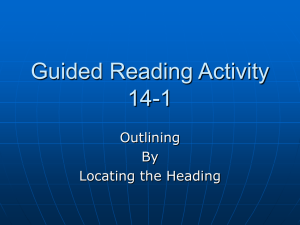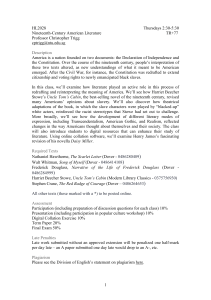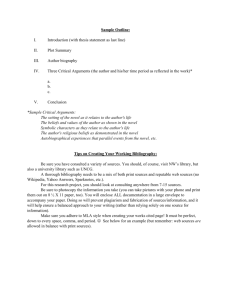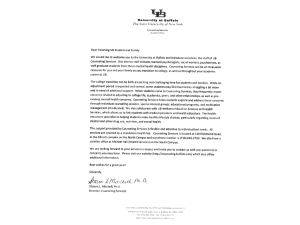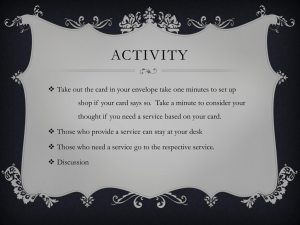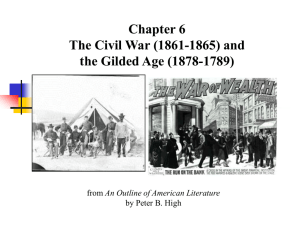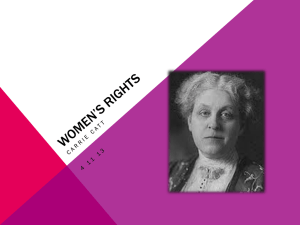11.5.4 - Women`s Suffrage Lesson
advertisement
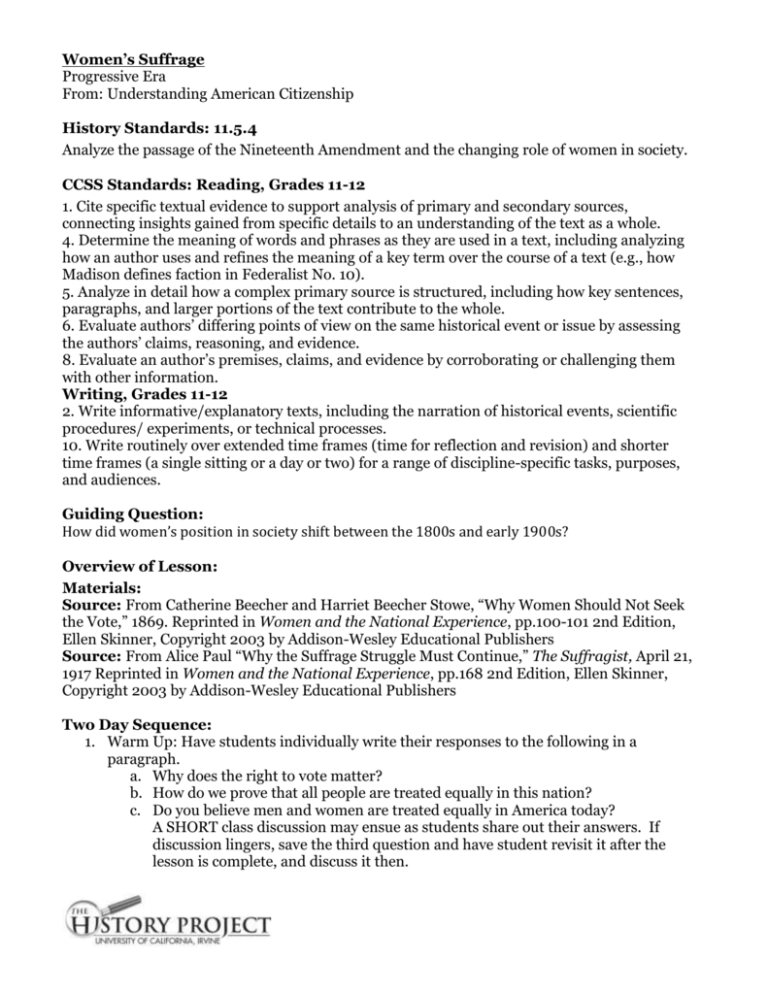
Women’s Suffrage Progressive Era From: Understanding American Citizenship History Standards: 11.5.4 Analyze the passage of the Nineteenth Amendment and the changing role of women in society. CCSS Standards: Reading, Grades 11-12 1. Cite specific textual evidence to support analysis of primary and secondary sources, connecting insights gained from specific details to an understanding of the text as a whole. 4. Determine the meaning of words and phrases as they are used in a text, including analyzing how an author uses and refines the meaning of a key term over the course of a text (e.g., how Madison defines faction in Federalist No. 10). 5. Analyze in detail how a complex primary source is structured, including how key sentences, paragraphs, and larger portions of the text contribute to the whole. 6. Evaluate authors’ differing points of view on the same historical event or issue by assessing the authors’ claims, reasoning, and evidence. 8. Evaluate an author’s premises, claims, and evidence by corroborating or challenging them with other information. Writing, Grades 11-12 2. Write informative/explanatory texts, including the narration of historical events, scientific procedures/ experiments, or technical processes. 10. Write routinely over extended time frames (time for reflection and revision) and shorter time frames (a single sitting or a day or two) for a range of discipline-specific tasks, purposes, and audiences. Guiding Question: How did women’s position in society shift between the 1800s and early 1900s? Overview of Lesson: Materials: Source: From Catherine Beecher and Harriet Beecher Stowe, “Why Women Should Not Seek the Vote,” 1869. Reprinted in Women and the National Experience, pp.100-101 2nd Edition, Ellen Skinner, Copyright 2003 by Addison-Wesley Educational Publishers Source: From Alice Paul “Why the Suffrage Struggle Must Continue,” The Suffragist, April 21, 1917 Reprinted in Women and the National Experience, pp.168 2nd Edition, Ellen Skinner, Copyright 2003 by Addison-Wesley Educational Publishers Two Day Sequence: 1. Warm Up: Have students individually write their responses to the following in a paragraph. a. Why does the right to vote matter? b. How do we prove that all people are treated equally in this nation? c. Do you believe men and women are treated equally in America today? A SHORT class discussion may ensue as students share out their answers. If discussion lingers, save the third question and have student revisit it after the lesson is complete, and discuss it then. 2. Show students a short PowerPoint presentation disclosing the basic facts surrounding women’s suffrage. Students should take notes on the presentation in whatever format you usually encourage. Make sure to define key vocabulary (suffrage, etc) as you go. 3. If time permits, watch a clip of Bad Romance: Women’s Suffrage by Soomo Publishing at the end of the lecture. 4. At the beginning of Day 2, have students do a quick warm –up that will require them to review their notes. Ask about the meaning of suffrage, who the key players were, why women asked for the vote, and when/where the movement started. 5. Pass out primary source texts to students, along with worksheets. Read “Why Women Should Not Seek the Vote” as a class, with appropriate step asides for vocabulary and clarifying questions (included on the reading). Ask the students what the document’s goal is. Go through the worksheet questions and have students confer with a partner for a few minutes, then ask the whole class for answers (this is a good time for random calls). After the first document and worksheet are completed, have students work in pairs to complete the second. 6. After students complete their primary source analysis (or for homework), have them address the following question in paragraph form: a. Describe the transitioning role of women from the 1800s through the early 1900s. Ask them to be specific in their summaries. Catherine Beecher and Harriet Beecher Stowe, “Why Women Should Not Seek the Vote” (1869) Questions Text 1. Who are intelligent and benevolent persons that Catherine Beecher and Harriet Beecher Stowe refer to? 2. What is the grand remedy that these intelligent and benevolent people want? 3. Why do Catherine Beecher and Harriet Beecher Stowe think it is dangerous to bring women into the political sphere? 4. What is the first argument that Catherine Beecher and Harriet Beecher Stowe make against women needing the right to vote? 5. What solution do Catherine Beecher and Harriet Beecher Stowe offer? 6. How does Catherine Beecher and Harriet Beecher Stowe describe men? What does that make women? 7. What do women have to gain with the right to vote? 8. According to Catherine Beecher and Harriet Beecher Stowe when will women get the right to vote? Many intelligent and benevolent persons imagine that the grand remedy for the heavy evils that oppress our sex is to introduce woman to political power and office, to make her a party in primary political meetings, in political caucuses, and in the scramble and fight for political offices; thus bringing into this dangerous melee the distinctive tempting power of her sex. Who can look at this new danger without dismay?... Glossary benevolent- well meaning caucuses- a meeting of the members of a legislative body who are members or a particular political party, to select candidates or decide policy. melee - a confused fight, skirmish, scuffle Let us suppose that our friends have gained the ballot and the powers of office: are there any real beneficent measures for our sex, which they would enforce by law and penalties, that fathers, brothers, and husbands would not grant to a united petition of our sex, or even to a majority of the wise and good? Would these not confer what the wives, mothers, and sisters deemed best for themselves and their children they are to train, very much sooner than they would give power and office to our sex to enforce these advantages by law? Would it not be wiser thing to ask for what we need, before trying to so circuitous and dangerous method? God has given to man the physical power, so that all that woman may gain, either by petitions or by ballot, will be the gift of love or of duty; and the ballot never will be accorded till benevolent and conscientious men are the majority - a millennial point far beyond our present ken. beneficent- good confer- grant or bestow circuitous- longer than the most direct way conscientiouswishing to do what is right, to do one’s work well and thoroughly millennial- a period of righteousness and happiness ken- one’s range of knowledge or sight Alice Paul, Why the Suffrage Struggle Must Continue (1917) Questions Text Glossary 1. What was decided at the national convention? 2. What is the “highest interest of the country” that the Nation Women’s party is serving? 3. As democracy is increasing in the face of war, what are women facing at home (in the U.S.)? 4. Within the Democratic caucus what are willing to discuss? 5. According to Paul, what war measure will create the greatest sense of unity? 6. What does Paul mean, “It will always be difficult to wage a war for democracy abroad while democracy is denied at home.”? 7. Do you find Paul’s linking suffrage to the U.S. involvement in World War I persuasive? In our national convention in March, our members, though differing widely on the duty of the individual in war, were unanimous in voting that in event of war the Nation Women’s party, as an organization, should continue to work for political liberty for women and for that alone, believing, as the convention resolution stated, that in so doing the organization “serves the highest interest of the country.”... unanimous- two or more people fully in agreement Never was there greater need of work for internal freedom in this country. At the very moment when democracy is increasing among nations in the throes of war, women in the United States are told that attempts at electoral reforms are out of place until war is over. The Democrats have decided in caucus that only war measures shall be included in their legislative program, and have announced that they will take up no new subjects, unless the President considers them of value for war purposes. Suffrage has not yet been included under his head...No “war measure” that has been suggested would contribute more toward establishing unity in the country, than would the giving of suffrage to all the people. It will always be difficult to wage a war for democracy abroad while democracy is denied at home. throes- intense or violent pain and struggle electoral reformschange in systems to improve public desires caucus- A closed meeting of party members within a legislative body to decide on questions of policy Catherine Beecher and Harriet Beecher Stowe, “Why Women Should Not Seek the Vote” (1869) 1. Who are intelligent and benevolent persons that Catherine Beecher and Harriet Beecher Stowe refer to? 2. What is the grand remedy that these intelligent and benevolent people want? 3. Why do Catherine Beecher and Harriet Beecher Stowe think it is dangerous to bring women into the political sphere? 4. What is the first argument that Catherine Beecher and Harriet Beecher Stowe make against women needing the right to vote? 5. What solution do Catherine Beecher and Harriet Beecher Stowe offer? 6. How does Catherine Beecher and Harriet Beecher Stowe describe men? What does that make women? 7. What do women have to gain with the right to vote? 8. According to Catherine Beecher and Harriet Beecher Stowe when will women get the right to vote? 9. Do you find Catherine Beecher and Harriet Beecher Stowe’s argument compelling? Cite specifics from the text to defend your position. Alice Paul, Why the Suffrage Struggle Must Continue (1917) 1. What was decided at the national convention? 2. What is the “highest interest of the country” that the Nation Women’s party is serving? 3. As democracy is increasing in the face of war, what are women facing at home (in the U.S.)? 4. Within the Democratic caucus what are willing to discuss? 5. According to Paul, what war measure will create the greatest sense of unity? 6. What does Paul mean, “It will always be difficult to wage a war for democracy abroad while democracy is denied at home.”? 7. Do you find Paul’s linking suffrage to the U.S. involvement in World War I persuasive? Why or why not? Cite specifics from the text.
